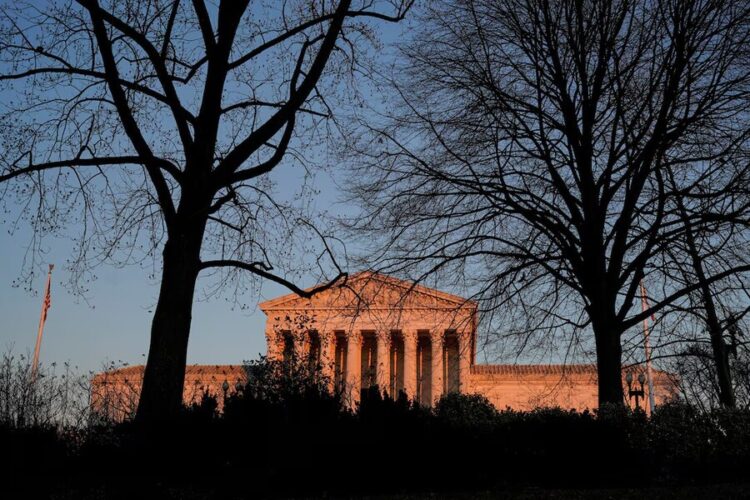In a pivotal session that could redefine legal boundaries, the U.S. Supreme Court recently undertook the arduous task of clarifying the federal bribery statute, a decision stemming from James Snyder’s conviction that now casts a long shadow over several significant public corruption prosecutions, including those involving former Illinois House Speaker Michael J. Madigan.
James Snyder, former mayor of Portage, Indiana, found himself entangled in legal battles after a 2019 conviction for accepting a $13,000 bribe from a company securing city contracts for garbage trucks. Although a subsequent retrial in 2021 upheld his bribery conviction, Snyder’s case has escalated to the Supreme Court, challenging the interpretation of “gratuities” under the bribery law.
The core issue revolves around whether mere gratuities, as opposed to explicit quid pro quo arrangements, suffice for bribery convictions under the current federal statute. The ambiguity of this law has led to a stark division among lower courts, described by Snyder’s defense as “entrenched and intractable.”
The Supreme Court’s decision will reach beyond Snyder, potentially affecting the outcomes of related high-profile cases, including the postponed sentencing of the “ComEd Four” — key figures in a bribery conspiracy involving Madigan. This group, including former ComEd CEO Anne Pramaggiore, was convicted in May 2023 of bribery conspiracy and falsification of business records.
U.S. District Judge Harry Leinenweber, responding to these complexities, chose to delay sentencing until the Supreme Court provides further guidance, emphasizing the need for clarity before proceeding. This stance was mirrored by U.S. District Judge John Robert Blakey, who deferred Madigan’s racketeering trial to assess the impending judicial clarifications.
During the Supreme Court deliberations, justices grappled with the philosophical and legal underpinnings of bribery and corruption. The discourse, rich with hypotheticals ranging from boutique store purchases to historical references to Illinois corruption, highlighted the justices’ struggle to delineate the boundary between lawful political interactions and corrupt practices.
Justice Neil Gorsuch’s inquiry into whether actions under scrutiny were akin to “venial” or “mortal” sins underscored the court’s attempt to refine the legal definitions. Meanwhile, Justice Brett Kavanaugh expressed concerns about the practical implications of the law, questioning how officials could differentiate permissible acts from unlawful gratuities.
The argument led by Assistant Solicitor General Colleen Sinzdak emphasized that acting “corruptly” entails a “consciousness of wrongdoing,” a definition that Justice Sonia Sotomayor found particularly perplexing, reflecting the court’s overall struggle with the statute’s vague language.
Reflecting on past decisions such as the controversial McDonnell ruling, the justices appeared wary of overly broad interpretations that might criminalize routine political activities. This precedent, which narrowly defined what constitutes an “official act” of bribery, significantly raised the bar for proving corruption, limiting it to actions that involve a formal exercise of governmental power.
The McDonnell case, involving former Virginia Governor Bob McDonnell’s acceptance of personal benefits for facilitating official meetings, set a high threshold for convictions, focusing on tangible, agenda-driven acts rather than informal influence.
The potential narrowing of corruption definitions through the Supreme Court’s decision has sparked a debate on the adequacy of legal frameworks to combat political corruption. Critics argue that loosening bribery laws might legalize nuanced forms of corruption, essentially allowing higher echelons of power to manipulate political outcomes subtly.
Conversely, proponents of a narrower interpretation claim it prevents the unjust prosecution of politicians conducting normal constituent services, thus protecting democratic engagement.
As the legal community and the public eye the Supreme Court’s upcoming decision, the implications are set to be monumental. Not only will it affect the accused in high-stakes cases like Snyder’s and the ComEd Four, but it will also potentially reshape the landscape of political law enforcement across the United States.
Judges like Leinenweber are poised to recalibrate their judicial approaches based on this decision, which will dictate the prosecutorial thresholds for bribery and corruption moving forward. The outcome could either reinforce the integrity of public offices or, as some fear, pave the way for a new era of tolerated, if not institutionalized, corruption.
The entrenched discrepancies among appellate courts concerning what constitutes a bribe underscore the necessity for a definitive Supreme Court ruling. This decision is not merely about individual legal battles but rather about setting a consistent legal standard that ensures public officials can act without ambiguity about the legality of their actions.
As the Supreme Court deliberates on this critical legal definition, the balance between preventing corruption and enabling free political action hangs in doubt. The forthcoming decision promises not only to clarify the law but to potentially redefine the ethical boundaries of American politics. In an era where political integrity is increasingly scrutinized, the Court’s ruling will undoubtedly leave a lasting imprint on the fabric of American jurisprudence and democratic governance.










